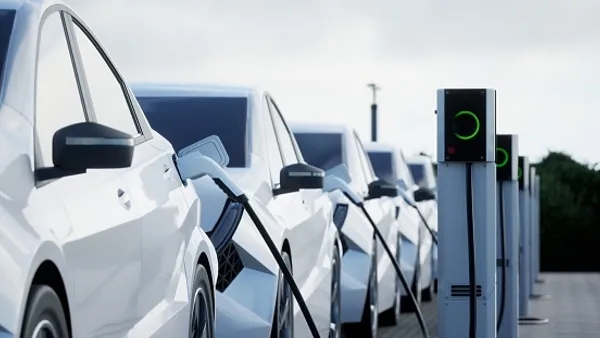Dive Brief:
- Global sales of electric vehicles (EV) will drop 43% in 2020 due to the novel coronavirus pandemic and its financial impacts, according to new research from Wood Mackenzie.
- In 2019 there were 2.2 million EVs sold, but the research firm expects just 1.3 million to be sold this year. However, WoodMac analysts say following a global recession this year, a strong rebound is possible in 2021 as nations employ stimulus measures to offset the virus's impacts.
- Observers of the EV market say they are not concerned about the overall outlook for emissions-free vehicles, as automakers have invested billions of dollars in rolling out new models. "We're still very bullish in the long-term," Plug in America Executive Director Joel Levin told Utility Dive.
Dive Insight:
Sales of electric vehicles will plunge this year, but experts see little reason for the sector to panic. Sales of just about everything — except perhaps toilet paper — are also expected to crater.
"Certainly the whole automobile market is going to take a hit this year, as are markets for everything, because people are at home sheltering," Levin said. "The number of cars sold will go down in the near-term, but we think EV sales will hold up very well — better than gasoline cars."
WoodMac's expectations for a precipitous decline in sales do not mean there is an existential threat to the electric vehicle market, Levin added. "It's kind of exaggerated," he said. "Every time anything bad happens, people say it's the end of the world and EVs are over."
WoodMac has looked to China for signs of how the pandemic could impact global sales, as the country was first to be hit by the virus. At the end of January, sales of all cars in China were down by 21% compared to 2019. And by February, they had plunged by 80%, according to the firm's research.
The coronavirus is creating potential delays to fleet purchasing due to lower oil prices and a wait-and-see approach to buying new models, according to the firm.
"The infection rate is expected to peak in Europe and North America towards the end of H1 2020, approximately two months after China," WoodMac principal analyst Ram Chandrasekaran said in a statement. "The January and February numbers therefore do not yet reflect the impact of coronavirus in the two regions."
New all-electric models could also be set back due to the virus.
"The automakers' response to the pandemic — suspending car manufacturing to focus on making medical equipment — is only going to delay model launches further," Chandrasekaran said.
WoodMac's analysis is based on a scenario where demand in the United States is worst hit in April and May, lockdown measures are not successful enough and EV demand remains 30% lower by the end of the year.
But the short-term impacts of economic shutdowns could actually bolster the long-term outlook for EVs, according to Chris Nelder, a manager with Rocky Mountain Institute's mobility practice. He pointed out that cities are seeing air pollution decline as cars stay idled and industry slows. And the traffic noise in many urban areas has markedly decreased, he said.
"I really believe that as we start to come out of this, a lot of people are going to think, 'I don't want to go back to polluted air and all that noise,'" Nelder said. "I believe that there will be much more awareness and interest in cleaning up our soundscape and our air, now that people have had a taste of what it can be like."
While there could be increased interest in electrification, Nelder also said companies are likely to stay the course. For now, along with a hit to vehicle sales, the pipeline of charging infrastructure will likely face a temporary delay.
"Most capital expenditure decisions are predicated on a decade or more," Nelder said. "When you're making financial investments on a horizon of a decade or more, you have to believe an interruption of a couple of months is not enough to really permanently change things."
Levin agreed, saying charging infrastructure "will probably be delayed somewhat. Over the next couple of months not a lot of construction is going on."
WoodMac's analysis also validates the idea that any slowdown in EV adoption is likely temporary.
"Despite the potential delays in EV adoption, several automakers have expressed a desire to be carbon neutral due to government policies and a change in investor attitude," Chandrasekaran said. "The shift towards sustainability is the driving force behind the electrification of transport. Uncertainty caused by the oil price war and global catastrophes will only serve to strengthen that resolve, not deter it."















